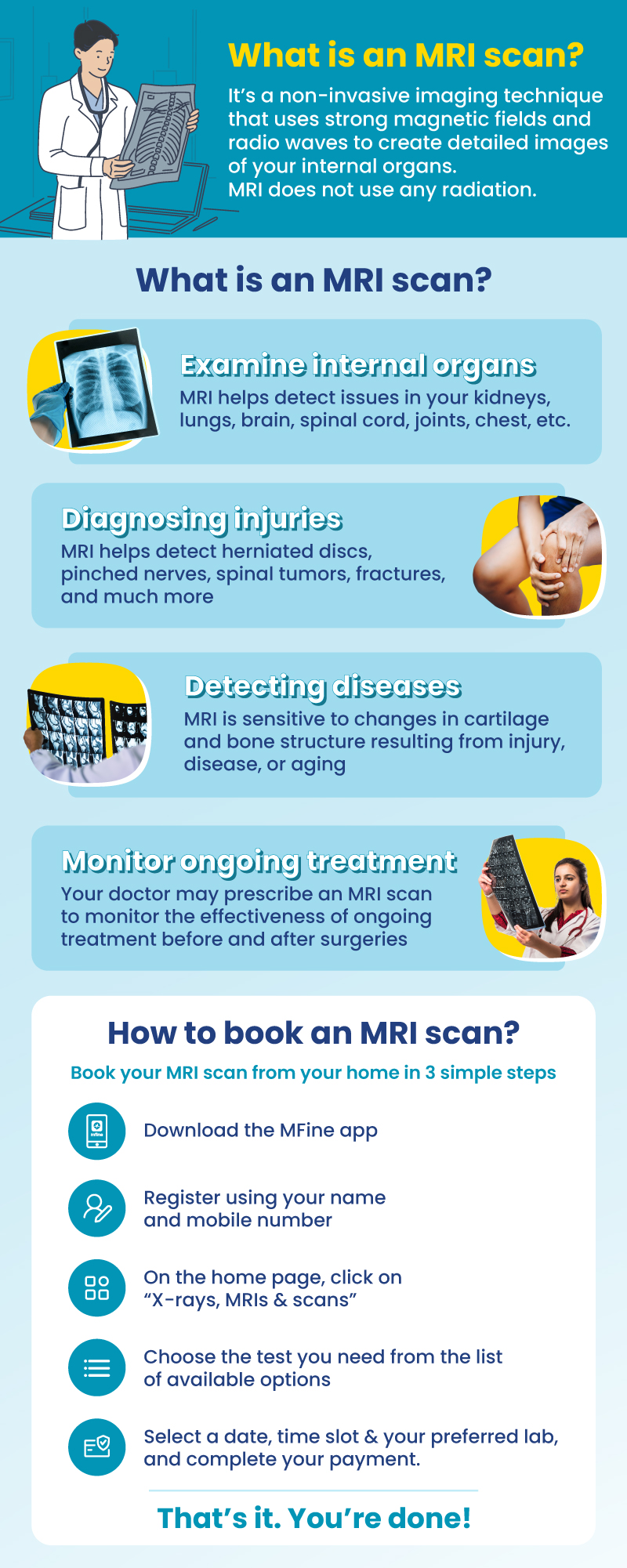
MFine presents an unbeatable offer! Avail up to 50% discount on Brain MRI scans in Hyderabad with no compromise on the quality of our advanced lab services.
MRI Scan in Hyderabad by MFine
|
Calling all residents of Hyderabad! MFine brings you a pocket-friendly offer for MRI scans. Say goodbye to high costs—get your scan for just ₹ 3,325!
Act now and call us at
Or click the button below to avail this unbeatable deal. Your health matters, and we’re here to help!
At MFine, we go the extra mile for your well-being. Book your MRI scan with us and receive a FREE online consultation with a skilled doctor.
Brain MRI scan costs in Hyderabad
Below are the discounted rates for the most common Brain MRI scans available in Hyderabad. Please note that these prices are subject to change, so reach out to us for the latest details.
| Different kinds of MRI Brain Scans | Starting Price |
| MRI Brain Scan Price in Hyderabad | ₹3325 |
| MRI Brain Contrast Price in Hyderabad | ₹4900 |
| MRI Brain Screening Price in Hyderabad | ₹1960 |
We understand that each individual’s MRI Brain Scan requirements may differ. Call us at ☏08068920280, and our team will help you explore the various protocols and book your scan at a convenient lab and time.
.
Why should I book an MRI through MFine?
|
Exclusive Benefits with MFine
(1) Certified labs
Get access to over 600+ labs certified by NABL and NABH
(2) Same-day slot available
Get scans done on the same day
(3) Quick and convenient
Get reports in 12 hours and digital films in 15 – 20 minutes
(4) FREE Consultation
Post scans, consult a doctor for free to review your report
What is a Brain MRI Scan?
An MRI Scan of the Brain is a safe and painless procedure that employs strong electromagnetic and radio waves to create high-resolution images of the head, encompassing:
- Brain
- Skull
- Facial bones
- Nerves
- Inner structures of your ears
- Eyes
- Other soft tissues like fat, bones, and connective tissues in your head.
The absence of ionizing radiation in MRIs ensures patient safety compared to X-rays and CT scans.

What is a brain MRI with contrast?
A contrast agent is a substance that is injected intravenously into your hands or arms to help improve the visibility of the images. This improves the diagnostic pictures’ visibility and specificity.
A contrast agent helps improve the visibility of
- Blood supply
- Blood vessels
- Tumors
- Inflammation and
- Hemorrhage
- White matter disease
- Fluid leaks, etc
They aid in the diagnosis of strokes, MS, dementia, and other brain infections.
Contrast materials are completely safe to use. You may, however, encounter some adverse effects, which is quite natural. Contrast agent-induced severe responses are relatively rare.
Why would a doctor prescribe an MRI of the brain?
An MRI of the brain is advised by doctors to aid in the diagnosis of various neurological conditions, such as:
- Strokes
- Dementia
- Encephalitis (brain infection)
- Brain aneurysm (a bulge in the blood vessel)
- Brain hemorrhage (bleeding in the brain tissue)
- Brain damage due to Epilepsy
- Multiple sclerosis (damage to nerve fibers)
- Pituitary gland diseases
- Traumatic brain injuries
- Migraines
- Seizures
- Hearing loss
- Hormonal imbalances related to the hypothalamus
- Extreme fatigue and weakness
- Significant changes in your thinking and behavior, etc.
What are the prerequisites for a Brain MRI scan?
Before undergoing a Brain MRI scan, several prerequisites should be considered:
- Doctor’s Referral: Obtaining a doctor’s referral is typically a standard practice before scheduling a brain MRI. The referral ensures that the scan is medically justified based on the patient’s symptoms and medical history, guiding the healthcare team in making appropriate decisions regarding the imaging study.
- Medical History: Providing a comprehensive medical history is crucial, especially concerning any brain-related conditions or neurological symptoms. Conditions like epilepsy, migraines, previous head injuries, or neurological surgeries can significantly impact the interpretation of the MRI results. Sharing this information helps the radiologist and treating physician in making accurate diagnoses and formulating suitable treatment plans.
- Allergies: It is essential for patients to disclose any known allergies, particularly those related to contrast agents. Contrast agents containing gadolinium are sometimes used during brain MRI scans to enhance image clarity. However, some individuals may experience allergic reactions to these agents, and informing the medical team is vital to avoid potential complications.
- Pregnancy: For female patients, it is imperative to notify the medical team if they are pregnant or suspect they might be pregnant. MRI scans are generally avoided during the first trimester due to potential risks to the developing fetus. Informing the medical team about pregnancy allows them to assess alternative imaging options that are safer for both the mother and the baby.
- Metal Implants or Devices: Mentioning any metal implants or devices present in the body is crucial before undergoing an MRI. Metal objects can interact with the MRI’s strong magnetic field, leading to image artifacts or potential risks to the patient. Patients with metal implants, such as pacemakers, aneurysm clips, or cochlear implants, may require specialized MRI protocols or alternative imaging methods to ensure their safety during the scan.
- Claustrophobia: Patients who experience claustrophobia, a fear of enclosed spaces, should inform the healthcare team in advance. MRI machines have a confined space, which can trigger anxiety or discomfort in claustrophobic individuals. By communicating this concern beforehand, the medical team can provide support and consider measures such as using open MRI machines or offering sedation to ensure the patient’s comfort during the procedure.
FAQs
How much does MRI cost in Hyderabad?
The cost of an MRI in Hyderabad can vary depending on the type of MRI (with or without contrast), the facility, and other factors. Usually, the market price of a brain MRI in Hyderabad is above ₹6500, but with MFine, you can get it for ₹3325 only.
Will brain MRI show eye problems?
While a brain MRI primarily focuses on imaging the brain and surrounding structures, it may incidentally capture certain eye-related abnormalities or conditions that affect the optic nerves or eye sockets. However, a brain MRI is not specifically designed to evaluate eye problems comprehensively. For specific eye-related concerns, dedicated eye imaging techniques and ophthalmological exams are more appropriate.
What kind of MRI is used for eyes?
For imaging the eyes and the surrounding structures, a dedicated eye MRI or orbital MRI is commonly used. This specialized MRI scan focuses on capturing detailed images of the eye sockets, optic nerves, and other eye-related structures. Orbital MRI is particularly useful for evaluating various eye conditions, including tumors, inflammation, and structural abnormalities.
Can brain damage affect eyesight?
Yes, brain damage can significantly impact eyesight. The visual system is closely interconnected with the brain, and any injury or damage to specific brain areas involved in vision processing can result in visual disturbances or loss of vision. Brain damage from head injuries, strokes, tumors, or neurological disorders can lead to various visual problems, such as blurry vision, double vision, visual field defects, or even complete loss of vision.
What neurological disorders cause eye problems?
Several neurological disorders can cause eye problems due to their impact on the visual pathways and brain areas responsible for vision. Some of these disorders include:
- Multiple Sclerosis (MS): MS can affect the optic nerves and cause vision problems, often leading to optic neuritis, which results in pain and visual disturbances.
- Stroke: A stroke that affects the occipital lobe (the brain’s visual processing center) can lead to visual deficits or even blindness.
- Brain Tumors: Tumors in or near the visual pathways can cause visual disturbances, depending on their location and size.
- Traumatic Brain Injury (TBI): Head injuries can damage the brain’s visual processing areas and result in visual impairments.
- Neurodegenerative Diseases: Conditions like Alzheimer’s disease or Parkinson’s disease may also cause eye movement disorders and visual disturbances as the disease progresses.
Does brain MRI show optic nerve damage?
Yes, a brain MRI can visualize the optic nerves to some extent, especially their course, as they pass through the bony structures of the skull. However, for a more detailed evaluation of the optic nerves and surrounding structures, a dedicated orbital or optic nerve MRI is preferred. Additionally, other specialized tests like optical coherence tomography (OCT) are commonly used to assess optic nerve health and detect early signs of damage.
Can a brain MRI detect glaucoma?
A brain MRI is not the primary imaging modality used to diagnose glaucoma. Glaucoma is an eye condition characterized by damage to the optic nerve, which can lead to vision loss. The diagnosis of glaucoma is typically made through a comprehensive eye examination, including measuring intraocular pressure, assessing the optic nerve appearance, visual field testing, and using imaging techniques like OCT. MRI is not considered a standard tool for glaucoma diagnosis but may be used in specific cases where there are concerns about other brain-related conditions affecting vision.
Does MRI have side effects?
MRI is considered a safe and non-invasive imaging technique, and it does not use ionizing radiation like X-rays or CT scans. As such, it does not have the immediate side effects associated with radiation exposure. However, some patients may experience claustrophobia or anxiety inside the MRI machine, but this can usually be managed with appropriate support and, in some cases, mild sedation. Additionally, the use of contrast agents in MRI (gadolinium-based contrast agents) may be associated with rare side effects, such as allergic reactions or, in patients with severe kidney dysfunction, the risk of nephrogenic systemic fibrosis (NSF). However, these side effects are relatively uncommon, and the use of contrast is carefully monitored by the healthcare team to ensure patient safety
Read a complete blog on MRI scan side effects.
Other topics you may be interested in
| For further assistance call us on ☏08068920280 |

 Call us:
Call us:


 Call
Now
Call
Now